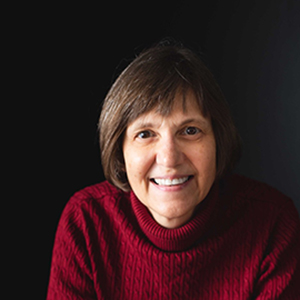Marianne Vermeer has been a hard working volunteer for the National Foundation for Ectodermal Dysplasias (NFED) for more than a decade. She quickly became active after finding the Foundation in 2013. She has served on the Board of Directors since 2016 and helps oversee Foundation finances as treasurer. Whatever is happening at the NFED, we can count on Marianne for her support!
The Virginia resident has been an active member of the Board’s Finance Committee, Family Conference Committee, Trivia Committee, Development Committee, and the Anniversary Gala Committee. Marianne has attended NFED family fundraising events and supported some from afar. Marianne always lends a helping hand at the Family Conferences where she is a regular attendee.
When she’s not volunteering, Marianne has wanderlust.
This is on a small plaque in my office: ‘I haven’t been everywhere… but it’s on my list.’
– Marianne
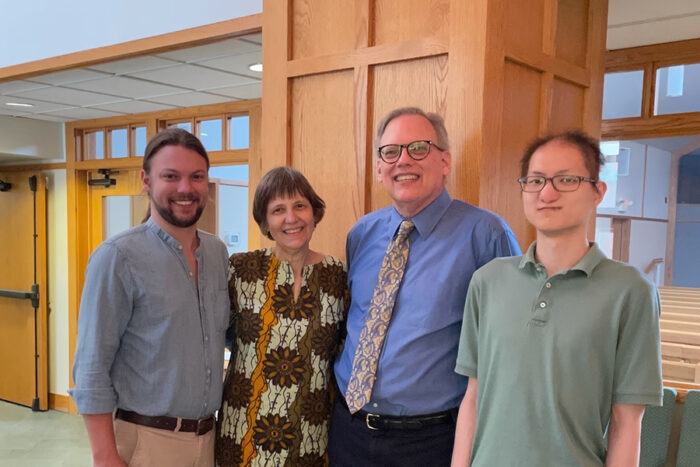
“Why? Because I love to travel and especially to out of the way and “non-touristy” destinations. My husband tells me I seem to seek out places where I could get typhoid. My passport is filled with countries in Asia, Africa, South and Central America, and a few in Europe. I even went around the world about 30 years ago. It took me a month to recover from that jet lag!”
She’s the owner of Vermeer Consulting Group where she helps clients increase impact by building financial sustainability. The NFED is proud to highlight Marianne and thank her for dedication to the NFED family. We asked Marianne to talk about her volunteer experience and what inspires her.
Share a little about yourself and your family.
We are an NFED family because of our son, Peter. Peter joined us from Northern China when he was one year old. We had no idea he was affected by ectodermal dysplasia until he was about two years old and a doctor treating him for something else suggested the possibility. She connected us with the late Dr. Frank Farrington and thus began our journey into the world of ectodermal dysplasias.
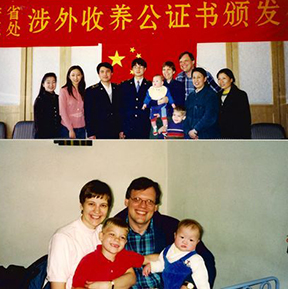
It took about 15 years to get to a diagnosis of Clouston syndrome, so it was a discovery process as we learned how Peter was affected over time. He has other diagnoses that have necessitated 13 surgeries and a constant learning process for his parents! Dr. Farrington encouraged our involvement with the NFED and I became a board member at his request. He was a “guardian angel” for our family and we still miss him.
Peter is now 25 years old, holds a master’s degree in environmental science and is currently looking for a new job after finishing a temporary position as a field scientist in ecological research with the Battelle Institute.
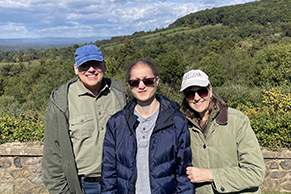
When did you realize you cared about the NFED cause?
I cared about this cause when we learned our son had ectodermal dysplasia and we had to learn quickly what it would mean for him and for his family.
Why do you give your time to help the NFED?
I give my time because I hope it strengthens the NFED for the future and furthers the opportunities for research that can help families for generations to come.
Why do volunteers matter in the NFED community?
One of the key attributes of the NFED is its network of affected individuals and its ability to “rally the troops”- whether it is for Ensuring Lasting Smiles Act (ELSA) advocacy, raising funds for more research, or creating excitement around a Family Conference. None of it would happen without the volunteers who give of their time and expertise to see that these efforts are successful.
What is your favorite volunteer event that you have attended?
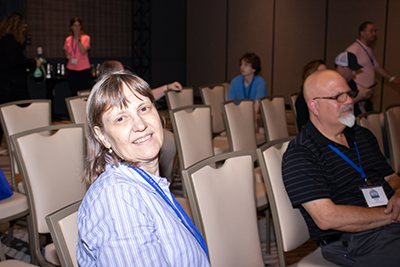
Family Conferences are my favorite. I enjoy meeting the families, seeing the children find others who look like them, and hearing how parents are persevering with school districts, insurance companies, medical and dental providers, and others to get what their child or family member needs. Always inspiring!
What is a particularly powerful moment you have had while volunteering?
Hearing about the results of research conducted in Europe and the joy of twin baby boys having sweat glands and teeth buds after treatment by Dr. Holm Schneider. The families participating in these studies are courageous and I admire them deeply. I make sure I am in the audience when they tell their stories because it always gives me hope!
What have you learned from volunteering?
I have learned about the power of research and the patience it requires to continue to push for advancements in the knowledge of what a particular genetic variation means and how we can “interrupt” the genetic code to give children a different future than they might otherwise have had.
Why is it important to attend NFED Family Conferences? What do you learn from attending?
I believe I’ve attended most of the past 10 Family Conferences. We’ve benefited from meetings with doctors who helped us understand our son’s diagnosis and the things he should be aware of as he grows older. We’ve also learned a lot about the genetic testing options available to Peter and found that extremely helpful.
All along, we’ve been incredibly impressed by the willingness of these clinicians and researchers to spend time with us, respond to emails after the conference, and connect us to resources that support Peter’s understanding of his diagnosis. It’s truly been amazing and a huge gift to him and our family.
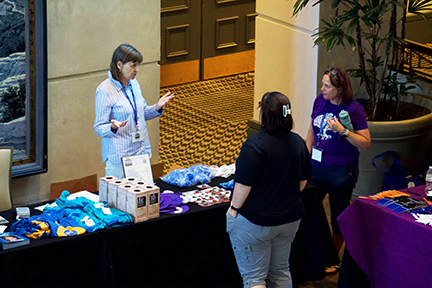
I’ve also personally gained new friendships and connections with other parents and fellow board members that enrich my life. I look forward to these meetings so that we can connect again and I can meet new families while sitting at a table selling T-shirts or taking pictures.
What have you learned from your experience?
I’ve learned that children are children, with or without teeth, hair, sweat glands, fingers, or toes. They love their parents, they want to eat ice cream, and they want to be part of a group that accepts them as they are. The NFED offered that to our son and it gave him a “tribe” to be part of when he struggled to figure out what his “tribe” could be.
We’re grateful to the NFED for that. While Peter has moved on to other interests and different “tribes”, this was important to him at a particular point in his life and therefore, important to us. We’ll always be grateful to Frank Farrington for the guidance he provided and for his insistence that we connect with NFED!
How do you plan to support this cause in the future?
Our family supports the NFED with a monthly contribution. We also support special events (the Halloween Bash and various family fundraisers) as we can. Personally, I’ll continue to come to Family Conferences as long as I’m on the board so that I can stay in touch with the joys and challenges that our NFED families experience.
Would you recommend volunteering for the NFED to others who are able?
Absolutely! This is a truly dedicated group of people, committed to doing the best they can for the families we serve and advancing our understanding of ectodermal dysplasias through advocacy for appropriate legislation, research and ongoing support for individuals affected by one of the ectodermal dysplasias. I am continually impressed by the dedication of the many individuals-staff, board members, Scientific Advisory Council members, and volunteers-who work to make the lives of people with ectodermal dysplasias better.
